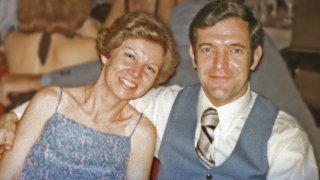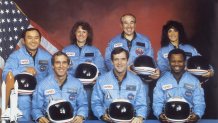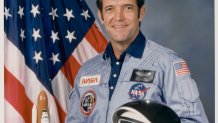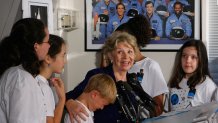
Thirty-five years after watching the space shuttle Challenger burst into flames moments after takeoff, killing her husband and six other crew members on board, June Scobee Rodgers continues to find ways to honor their legacy — and their mission
Rodgers is the widow of Dick Scobee, the commander of that fated flight, who died along with the rest of the Challenger crew when the shuttle broke apart 73 seconds after takeoff on Jan. 28, 1986, as Rodgers and their two children, along with the rest of the crew's families, looked on from the Florida shore. Today she is 78 years old and a great-grandmother, living in Chattanooga, Tennessee, with her second husband, retired Lt. Gen. Don Rodgers.
Yet her life is still very much tethered to that tragic moment, and, in a way, she has absorbed the Challenger's unfinished mission as her own.
"The media froze our grief in newspapers and TV clips," Rodgers told TODAY. "It was so unbearable."
Throughout the years, multiple books, documentaries and TV specials have been devoted to the Challenger disaster, including a recent Netflix docuseries, "Challenger: The Final Flight," which examined the mechanical failures and behind-the-scenes decisions that led to the destruction. Rodgers called the series "the most thorough" retelling of what happened.
She's always known her husband had concerns about the mission. "We talked about those risks, and he was willing to take those risks," she said.
Still, she found the series eye-opening.
"I learned a great deal that I didn't know," she said, adding that, following the show's success, one of the filmmakers called her to say hers was the most searched name on Google that day.

Yet having tragedy on replay comes at a price, which Rodgers realized early on.
U.S. & World
News from around the country and around the globe
Shortly after her husband's death, she knew that she would need to funnel her grief into something positive, something that would continue the Challenger crew's legacy. She and the other families launched the Challenger Center for Space Science Education in 1986, which aims to educate students about aerospace through mock space stations and simulated missions to the moon or Mars. New virtual programming began during the COVID-19 pandemic.
The Challenger's STS-51L mission, its tenth, was famously supposed to launch NASA's Teacher in Space Project, which would bring teachers along on missions as non-astronaut civilians.
Christa McAuliffe, a high school teacher from New Hampshire, was chosen to be the first teacher in space, and the plan was to have her teach lessons to students from orbit. The mission also sought to deploy a satellite and observe Halley's Comet for several days.
Rodgers, a former teacher herself, views the Challenger Center as an extension of that 1986 mission, and of her husband's mission.
Before being selected as an astronaut candidate in 1978, Scobee was an engineer for the United States Air Force who went on to become a decorated combat pilot in the Vietnam War. He was 46 years old when he died.
Rodgers recalled how her husband would always redirect attention to her, eager to honor her work as an educator.

"He was very serious, very humble," Rodgers said. "He was always bombarded by people saying, 'Oh, you're an astronaut, tell me all about it.' But he was a bit modest, and he would immediately turn and say, 'I want you to meet my wife. She's the one with the honorable profession.'"
Today there are 38 Challenger Centers across the U.S. In fact, that's usually where Rodgers spends each anniversary of the tragedy: at one of the centers, watching the students.
"When they step out onto the moon or build habitats on Mars in their missions, to see the joy on their faces, that we would have seen on the faces of the Challenger crew when they returned home ... as you can imagine, it's quite rewarding," she said.

Of course, this year is different. Like the rest of the world, Rodgers has been cooped up at home for the past several months.
"My travel bag is weeping in the closet," she said.
She bides her time with lots of virtual meetings, daily walks and the occasional treat of Ben & Jerry's chocolate ice cream, waiting for the world to reopen. Typically, her schedule is full — giving speeches, jaunting to Europe with her husband and friends, attending board meetings with the other Challenger families. She's remained close to them all these years, especially with Steven McAuliffe, Christa's widower.
With in-person events on hold, this year she'll have to find a new way to mark the anniversary. Ever the adapter, she ponders doing it virtually.
"Perhaps, the Challenger families can have a little Zoom meeting and reflect on how far we've come in 35 years," she said.
CORRECTION (Jan. 28, 2021, 12:28 p.m. ET): An earlier version of this article misstated where Christa McAuliffe was from. She was from New Hampshire, not Connecticut.
This story first appeared on TODAY.com. More from TODAY:



